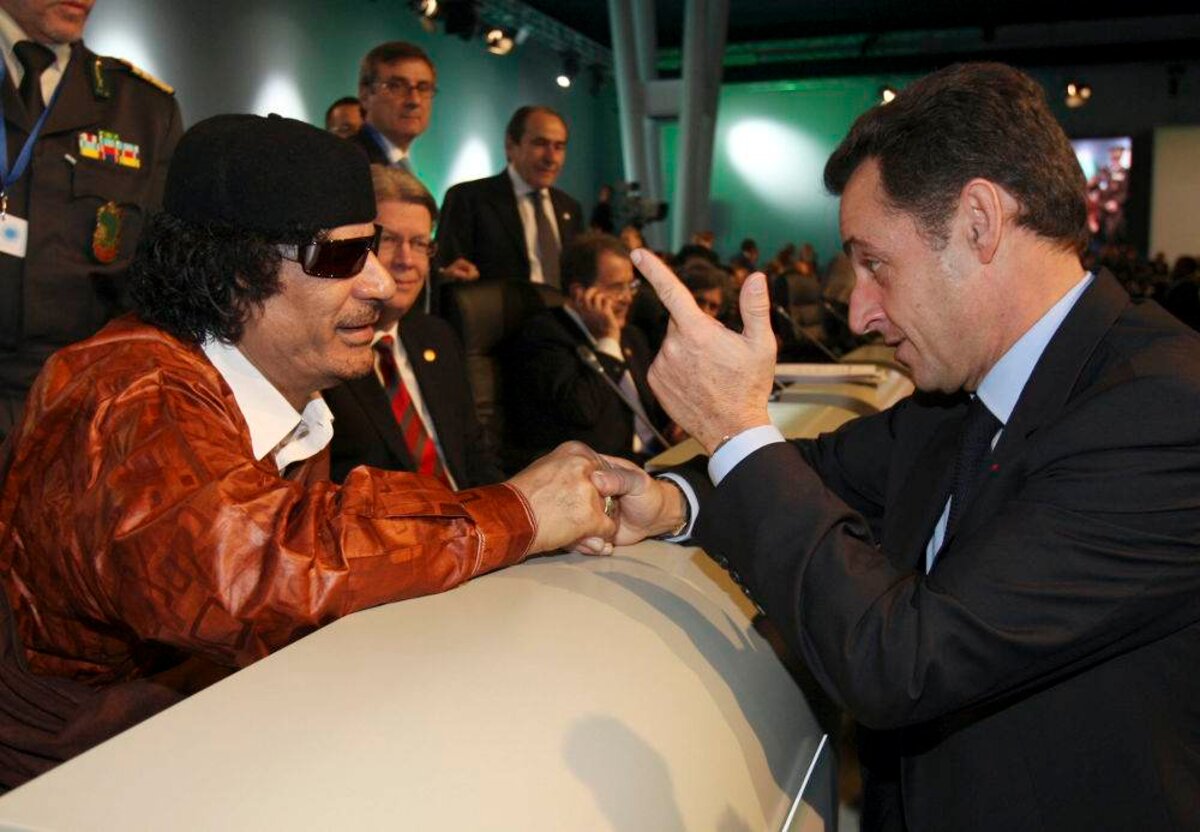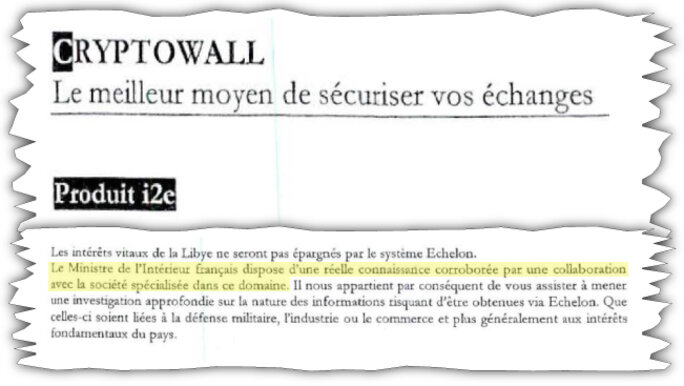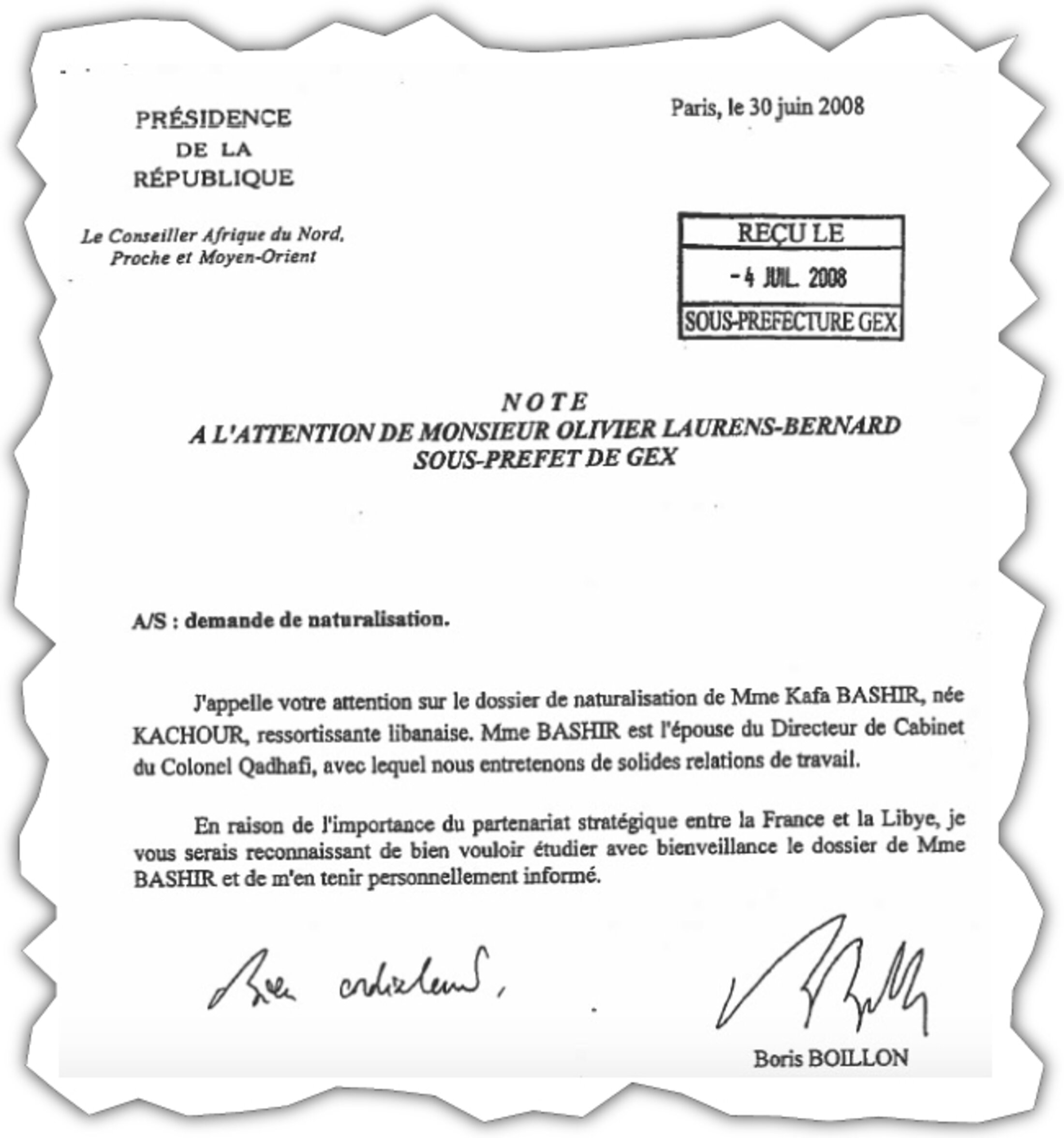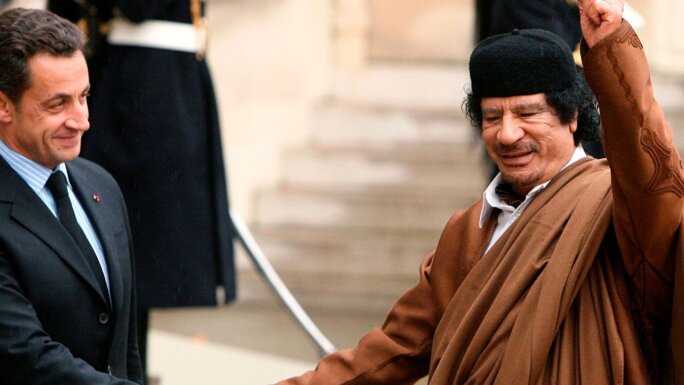Behind all corruption pacts there is a secret coming together of converging interests. The person who gives expects something in return from the person who receives. In the Libyan funding corruption scandal this has become a central issue in the formal investigation former French president Nicolas Sarkozy is facing for “passive corruption” - he is also been investigated for “illicit funding of an electoral campaign”and “receiving and embezzling public funds” from Libya.

Enlargement : Illustration 1

As has been evident from the investigation, it is clear what Sarkozy's interests and those of his allies implicated in the affair would have been. The hidden funding from Libya is said to have helped finance Sarkozy's successful 2007 presidential campaign and also, in the case of Sarkozy's former campaign director Claude Guéant, been used for personal benefit. Guéant, who became President Sarkozy's chief of staff and then his interior minister, is said to have bought a flat in Paris with money from Libya. Both men strongly deny any wrongdoing.
However, what were the Libyan interests that Nicolas Sarkozy is accused of having served in return for the money? During his first appearance before examining magistrates on March 21st, the former president asked: “You've indicated that I worked with a view to favouring the interests of the Libyan state. How can one say that I favoured the Libyan state?” Sarkozy then referred to the military intervention in Libya in 2011, of which the French president was the leading proponent on the international stage.
The next day, speaking on the main evening news bulletin of TF1 television channel, Nicolas Sarkozy used even stronger words to describe the claim that he helped Libya in return for money. “It's a monstrosity,” he declared. The reality, however, is not so favourable to the ex-president. Here, set out in five acts, is the story behind Nicolas Sarkozy's latest lie in the Libyan affair.
- Act I. Digital warfare and spyware equipment for Gaddafi
While he was opening the doors of the Gaddafi regime to Nicolas Sarkozy between 2005 and 2007, the middleman Ziad Takieddine was negotiating with Sarkozy's office – he was interior minister at the time – and the French company Amesys/i2e to sell online warfare and surveillance software to the dictatorship.
From April 2007 Takieddine went on to receive more than 4 million euros in hidden commissions paid via tax havens in relation to this deal. The negotiations had ranged across several different areas: the sale of spy software (called Eagle) for use across the Libyan internet, the delivery of a 4x4 protected by a scrambler to stop eavesdropping (called Shadow) and the future supply of a technology system (known as Cryptowall) to block surveillance from the American National Security Agency (NSA) .
An internal Amesys/12e document, sent to the Libyan regime during the Takieddine negotiations, shows the close relationship between the Interior Ministry and the French company. “Libya's vital interests will not be spared by the Echelon system [editor's note, the NSA's surveillance system]. The French Minister of the Interior has a real knowledge backed up by working with the company specialised in this domain,” reads one document obtained by Mediapart. The minister of the interior in question was Nicolas Sarkozy.

Enlargement : Illustration 2

In Libya, France's main contact for the Amesys deals was Abdullah Senussi, Gaddafi's brother-in-law and his head of secret services. It was he who received the 'Eagle' equipment in Tripoli in 2008, by which time Nicolas Sarkozy was in the Élysée. And it was this very spyware which allowed Gaddafi's regime to intercept the emails of, to keep watch on, to question and ultimately in some cases to torture the first dissidents in the Libyan city of Benghazi in February 2011, a full month before war broke out in Libya. So Nicolas Sarkozy, having armed the regime against rebel insurgents, later began the process of recognising the rebel's National Transitional Council.
During the war itself investigators from the NGO Human Rights Watch (HRW) found evidence of the collaboration between Sarkozy's France and the Libyan regime. “We found embarrassing documents for France in Abdullah Senussi's office. It involved documents concerning an electronic surveillance system sold to Libya by the French company Amesys,” Peter Bouckaert, one of HRW's senior officials, told French investigators in March 2015.
As for Amesys's boss Philippe Vannier, he was made a knight of the Légion d'Honneur in 2011, during Sarkozy's presidency.
- Act II. Intervening to help two key Libyan figures
Abdullah Senussi was not only one of Gaddafi's key security chiefs. As far as the French justice system is concerned he was also the main figure convicted for his part in the 1989 in-flight explosion onboard a French UTA airline DC10 passenger plane over Niger, in which 170 people lost their lives, including 54 French citizens. As Mediapart has shown, Sarkozy's team employed all its energies and contacts from 2005 to try and change his judicial status and nullify the international arrest warrant that Senussi was the object of following his conviction in absentia in 1999. This Libyan demand was already on the table during negotiations about compensation for families of the victims of the attack.
Nicolas Sarkozy's lawyer Thierry Herzog – who is facing a corruption trial alongside the former president over attempts to persuade a judge to pass on inside information – went into action over the Senussi case. Armed with a signed brief from Senussi himself, Herzog took the issue up after 2006 with several colleagues (see documents below). When he was later questioned in custody about the links between Herzog and Senussi, Sarkozy confirmed the contacts but insisted that the mandate given to Herzog was “thrown in the bin”. The ex-president added that “Mr Senussi tried by every means to benefit from the skilled services of Thierry Herzog”.
Other information in the hands of the judges proves that, until until 2009 at least, some actions were carried out under the direct auspices of the Élysée in a bid to strike down Senussi's international arrest warrant.
Today Abdullah Senussi is being targeted by French judges as one of the senior Libyan figures who sent five million euros via Ziad Takieddine – both men have admitted it – to fund Sarkozy's electoral projects in 2006 and 2007. Senussi is also the man whom Sarkozy ally Brice Hortefeux – then local government minister – secretly met in Tripoli in December 2005 in the presence of Takieddine with no other person present. This meeting took place during a visit to Libya by Hortefeux that the French ambassador of the day has since said did not make “much sense”.
'How wonderful these human rights lessons and postures are' – Sarkozy in 2007

Enlargement : Illustration 5

Another senior Libyan figure received favours from Nicolas Sarkozy in the first months of his presidency. This was Bashir Saleh, Gaddaffi's chief of staff and head of the regime's multi-billion dollar Libyan African Portfolio (LAP). During a telephone conversation between Sarkozy and Gaddafi, Saleh was designated by the Libyan leader as the person in charge of “delicate issues” between them. In Paris Saleh was taken care of by the other middleman in the affair, Alexandre Djouhri, who is today on bail in London, awaiting possible extradition to France. Djouhri put the Libyan up at the Ritz in Paris on several occasions.
In 2008 the Élysée swung into action behind an application for naturalisation by Saleh's wife, Kafa Kachour, seeking an exemption and applying direct and written pressure on the prefecture authorities who were handling the request. In June of that year Nicolas Sarkozy's diplomatic advisor Boris Boillon, who knew the Libyan regime well – he nicknamed Gaddafi 'Papa' – called the sub-prefect's office in the Ain département or county in eastern France where the Saleh family have a huge villa. He asked for particular attention to be given to Mrs Saleh's naturalisation. But the problem was that the claimant did not meet all the conditions to get French nationality, as the prefecture stated in emails obtained by Mediapart.
Undaunted, on June 30th Boris Boillon sent a letter to the sub-prefect involved, Olivier Laurens-Bernard. In it he wrote: “I draw your attention to the naturalisation case of Mrs Kafa Bashir, née Kachour, Lebanese citizen. Madame Bashir is the wife of the chief of staff to Colonel Gaddafi with whom we maintain strong working relations. In view of the importance of the strategic partnership between France and Libya, I would be grateful if you would look kindly at Madame Bashir's case and keep me personally informed of it.”

Enlargement : Illustration 6

Despite final objections from the prefecture about the fact that such naturalisation was an exception to the normal rules, Mrs Saleh duly received French nationality. It was announced officially in the state publication, the Journal official, on November 14th, 2008.
Today Bashir Saleh is at the centre of the judges' investigation into the Libyan affair. He is suspected, along with the middleman Alexandre Djouhri, of being behind the financial operation that allowed Claude Guéant to buy himself an apartment in Paris in 2008. He is also the man who, during the 2011 war, is said to have left with the key documents about the Franco-Libyan corruption affair. This would explain all the effort made by Nicolas Sarkozy to save him on two occasions, first of all in Tripoli in 2011 and then in Paris the year after.
As for Boris Boillon, in July 2013 he was arrested on a platform at the Gare du Nord railway station in Paris and found to be carrying 350,000 euros and 40,000 dollars in cash inside two bags. The former Sarkozy advisor was unable to give a convincing explanation for the origin of the cash and in July 2017 was convicted and given a suspended jail term for laundering the proceeds of tax fraud. He has since appealed.
- Act III. Legitimising the dictator in the eyes of the world
This is the most visible, even spectacular of the various ways that Nicolas Sarkozy served the interests of the Libyan regime. At the French president's invitation, Muammar Gaddafi came to Paris amid great pomp and ceremony with the French authorities rolling out the red carpet for the dictator like no other democracy had done until then.

Enlargement : Illustration 7

This was a massive victory for Gaddafi who felt he was thus legitimised in the eyes of the entire world by the country that had produced the Declaration of the Rights of Man. The tyrant was given full honours during his six-day visit, including being allowed to put his Bedouin tent in the gardens of the state-owned property the Hôtel Marigny and getting a private tour of the Château de Versailles.
The reception afforded to Gaddafi, who hitherto had been regarded as one of the main backers and architects of anti-Western terrorism, provoked huge anger among the Left in France and led to embarrassed silence in the ranks of the ruling conservative party of the day, the UMP.
At the time Nicolas Sarkozy, who today talks of Gaddafi as an “infamous dictator” to try to distance himself from suspicions of illegal funding, dismissed the arguments of those who were angry on behalf of France about the presence of the dictator from Tripoli. The day after Gaddafi's arrival on December 8th, 2007, Nicolas Sarkozy said of the tyrant: “He has his own personality, his temperament. I'm not going to judge him.”
A week later, after the end of the deeply controversial visit, the French head of state stood by his decision and mocked his opponents: the prefecture authorities who control permission for such events. “'How wonderful these human rights lessons and postures are,” he said.
- Act IV. Weapons...again
For a large number of French industrialists, Libya's Gaddafi was not seen as a dictatorship but a potential client during Nicolas Sarkozy's presidency.
In his recently-published book 'Profession: agent d'influence', the former vice president of aerospace giant EADS - now called Airbus – and a man with deep knowledge of Libya, Philippe Bohn, recounts an anecdote which says a great deal about the bowing and scraping of the Élysée to satisfy the slightest needs of the Gaddafi regime in 2007.
The scene took place in December 2007, three days before Gaddafi's arrival in France. Philippe Bohn, then at EADS, was in Paris with one of Gaddafi's sons Saadi, who was in charge of his country's special forces and authorised by his father to discuss arms deals.
Bohn recalls: “On Friday December 7th at 8pm, I was charged with taking Saadi Gaddafi, almost secretly, to the Élysée to the office of [Élysée] secretary general Claude Guéant ...in Guéant's office there were just four of us around the table: Saadi Gaddafi, an authorised emissary from his father. Admiral Edouard Guillaud, the president of the Republic's chief military adviser, the Élysée's secretary general and myself. Studious atmosphere. In a striking dialogue with Saadi we were going to finalise the Guide's [editor's note, Gaddafi who styled himself the Supreme Guide] shopping list for his official visit. Guéant started off by turning to me.
'So Philippe, what shall we start with?'
'Perhaps the Rafales [editor's note, French fighter jets] Mr Secretary General.'
'Ah, that's generous on your part, it's not your company [editor's note, the Rafale is made by French firm Dassault]. Right, ok, how many shall we say?'
I turn towards Saadi who intervenes. Guéant resumes by addressing Edouard Guillaud:
'Very well admiral. Note down 14, and now?'
I announce:
'The Tigre helicopters.'
Guéant again:
'There, that's yours. Dear Saadi, how many would you need?'”
None of the deals discussed on that day would be concluded in the end. The war, started in worrying circumstances three years later, put an end to the negotiations. But that was not true of all arms deals.
When they searched EADS's headquarters investigators came across documents confirming the 2007 sale of Milan anti-tank missiles by EADS subsidiary MBDA to Libya for a total of 168 million euros. The equipment was, according to various sources, delivered to the North African country between 2008 and 2010.
- Act V. The nuclear industry too...
One of the Élysée's obsessions under Nicolas Sarkozy was selling nuclear power to Libya. In 2012 Nicolas Sarkozy denied this, but several documents prove the contrary. In the first official telephone conversation between the newly-elected Sarkozy and Gaddafi on May 28th, 2007, the French president said to the Libyan leader: “I want to give a new dimension to our bilateral relations, for example in relation to nuclear energy, and if you agree, I'm ready to send an exploratory group to study the issue...”
Two months later, on July 25th, France and Libya signed a memorandum on nuclear cooperation of which article 3 referred to “projects for the production of nuclear energy and desalination of water as well as other development projects linked to the peaceful use of atomic energy”.
.
In 2012 the former head of French nuclear company Areva, Anne Lauvergeon, described in her book 'La femme qui résiste' how this decision by the Élysée to sell nuclear energy to the Libyan dictator was taken against Areva's recommendations. Anne Lauvergeon even spoke of “pressure” from the Élysée. “In the summer of 2007 France and Libya signed a nuclear co-operation agreement after the freeing of the Bulgarian nurses [editor's note, who had been held by Libya]. Straight away the pressure from the Élysée started to sell some nuclear power stations to the Libyans,” she wrote.
Anne Lauvergeon continue: “Was that rational? No. Clearly not. Why? When you have a nuclear reactor you need a nuclear safety authority. This policing body must, if safety is at stake, be able to order the power station to close down. With a dictator such as Gaddafi you can bet that the boss of the safety authority will go to prison – at best. At worst you might fear they'd be executed. So it's not responsible to sell a power station in such circumstances. Nuclear is not trivial thing. You can't sell just anything to anyone.”
---------------------------------------------------------------------------------
- The French version of this report can be found here.
English version by Michael Streeter


